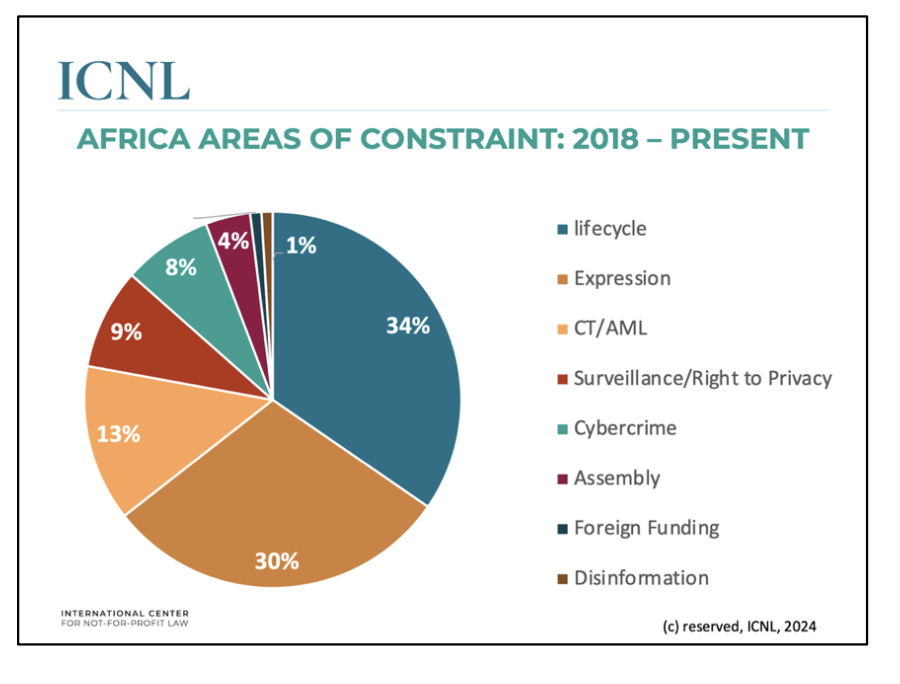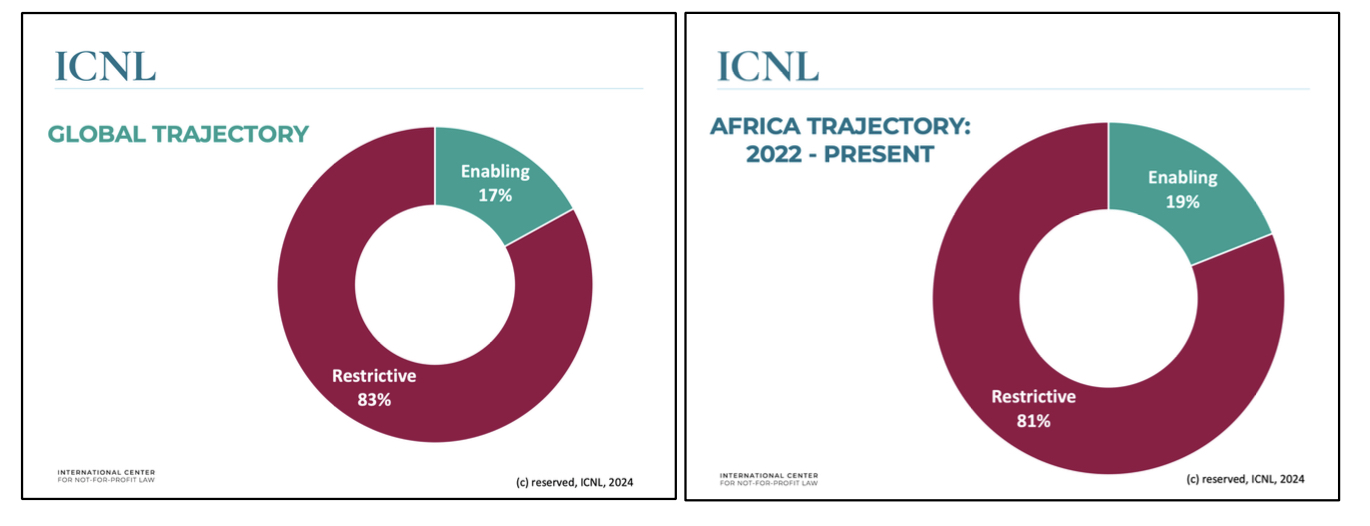Rachel Ansley reports on the “PTF Africa Civil Society Forum on Shrinking Civic Space” that brought together CSO representatives from Gambia, Ghana, Guinea, Kenya, Malawi, Mali, Niger, Nigeria, Rwanda, Senegal, Togo, Uganda and Zambia, as well as regional organizations.
 November 5, 2024: Civil society organizations (CSOs) in an increasing number of countries face interrelated and increasingly complex challenges that are contributing to the gradual but persistent shrinking of civic space. These conditions affect the ability of civil society and individuals to participate meaningfully in national and local affairs.
November 5, 2024: Civil society organizations (CSOs) in an increasing number of countries face interrelated and increasingly complex challenges that are contributing to the gradual but persistent shrinking of civic space. These conditions affect the ability of civil society and individuals to participate meaningfully in national and local affairs.
This is certainly the case across the African continent, where PTF’s CSO partners (and other CSOs) are working to highlight this crisis and show why shrinking civic space matters, as well as the role CSOs have to play in countering this challenge.
On a daily basis, CSOs face diverse constraints on their efforts to promote transparent and accountable governance, as they reflected candidly at a recent PTF forum. These include policy and legislative barriers, arbitrary regulations, politically inspired personal harassment and threats, and even physical violence. However, they also shared their diverse approaches to facing and mitigating these challenges, including the importance of constructive engagement with governments to emphasize the added value of CSOs in service delivery, for example.
Global & African Trends
Shrinking civic space in Africa is part of a broader global trend of democratic recessions. According to the International Center for Not-for-Profit Law (ICNL), 83% of legal measures in 84 countries over the past 5 years have been restrictive, and only 17% enabling. (ICNL 2024)
This is evidence of the growing trend of governments looking to clamp down and stifle voices critical of them and against corruption, particularly civil society. Trends in Africa echo this global trajectory. Addressing the phenomenon of shrinking civic space requires a keen understanding of the mechanisms at work to restrict the work of civil society, how they manifest in the lives of civil society actors individually and collectively, and the role of CSOs themselves in a whole-of-society approach to find remedies.

“In line with what we see with a growing trend of authoritarianism, governments are looking for ways to clamp down and stifle voices.” – Florence Nakazibwe, ICNL
These questions formed the core of a recent PTF Africa Civil Society Forum on Shrinking Civic Space centered on conversation and co-creation among peer organizations and like-minded colleagues. The forum, split into two sessions, covered the primary challenges and issues facing CSOs in their efforts to provide essential services in their communities and promote transparent and accountable governance, as well as solutions either implemented by participants or suggested based on best practice.
As seen in many African countries, shrinking civic space primarily results from the range of methods and measures used by governments—both authoritarian and democratic—to constrain the activities of CSOs and limit their influence. According to Florence Nakazibwe at ICNL, who delivered a presentation during the first session of the Forum, “In line with what we see with a growing trend of authoritarianism, governments are looking for ways to clamp down and stifle voices.”
Direct efforts and measures to crack down on civil society include the criminalization of speech, smear campaigns, digital repression, legal persecution, and direct violence. More indirect, but equally restrictive methods include administrative barriers to operations, stigmatization of CSOs, and the securitization of government administration.
Taken together, these governmental actions, work to reduce access to information, increase the opacity of government operations, limit transparency, and restrict opportunities to hold governments accountable to their citizens.
Consequences of Shrinking Space
The longstanding challenges of shrinking civic space have been compounded by increasing authoritarianism in some countries, particularly in West Africa. Recent policies and measures have contributed to the increasing crackdowns on civil society. In Guinea, for example, civic mobilizations have been shut down. Election cycles also align with increasing crackdowns, especially when incumbent regimes seek to hold on to power. While certain contexts are more repressive than others, civil society across the continent bears the burden of these changing circumstances.
However, this high-level review alone does not adequately convey the consequences of shrinking civic space for civil society actors who live and work in the communities most affected by the consequences of corrupt and opaque governance. Many forum participants offered first-hand accounts of the challenges they endured, and the perspectives gained from front line engagement within a constrictive operating environment.
They described, for example, how the rise in restrictive legislation such as foreign agent laws, arbitrary financial limitations and government actions, and censorship hinder CSO operations and increase the threats to their personal safety and security. They also discussed the challenges posed by difficulties in accessing publicly held information to better understand the nature and scope of civic space restrictions. This also undermines their ability to mobilize resources to address the challenges.
One individual shared a harrowing experience of a targeted physical attack, the culmination of an ongoing smear campaign and reputational assaults. Strategies to impugn the reputation of civil society actors, along with actual or threatened violence are not uncommon. Another participant described the challenges CSOs face when engaging with foreign donors who do not understand the reality of their experiences engaging with restrictive governments. The lack of access to information not only complicates the work of CSOs, but undermines their ability to effectively present evidence on the challenges they face to external actors who could provide much needed support.
Countering Restrictions
Despite these challenges, CSOs have been at the forefront of innovative strategies to counter the trend of shrinking civic space. Due to their proximity to and knowledge of local communities, as well as their utility to governments in delivering public services, CSOs have an essential role in the fight to promote transparency. Forum participants also noted the ways in which CSOs are uniquely positioned to engage diverse stakeholders across communities and create broad coalitions of support to push back against increasing restrictions.
The primary tactics used thus far to advance civic space include constructive approaches to engaging governments while maintaining autonomy and integrity, seeking effective entry points to cooperation with government, and promoting effective communication with all stakeholders.
One participant described the ways in which their organization works in consortia with other government partners such as the private sector to reduce the confrontational nature of interactions between CSOs and the governments they hold to account. This creates the space for CSOs to engage on key issues while changing the nature of the civil society-government dynamic. By developing such inroads, civil society representatives are able to identify and access “entry points” to more productive engagement with governments, such as working with champions in government and building alliances with the private sector.
Another CSO representative used a recent experience implementing a service delivery project at the local level to highlight the essential role CSOs play in providing key services to complement governments. In emphasizing such complementarity, rather than oppositional strategies, PTF’s CSO partners are building positive rapport with government partners and potentially bringing innovative solutions to an otherwise difficult problem. Participants stressed the importance of an evidence-based approach to build credibility and alliances.
Moving from Confrontation
Ultimately, civil society groups across Africa grapple with the challenges of shrinking civic space and its impact on their work. However, PTF’s partners are seeking to transform the often confrontational and repressive relationship between civil society and governments, in order to address the problems of transparency and accountability to improve governance and service delivery in a productive way.
In Malawi, a PTF-supported project promoted evidence-based dialogue between duty bearers and CSOs to improve performance and budget expenditures in public infrastructure procurement. In Zambia, the active engagement of social accountability committees with school management and local authorities delivers more accountable education services in nine districts. These initiatives incorporate social accountability mechanisms, constructive engagement with authorities, and citizen engagement to ensure transparent and accountable service delivery in ways that mitigate the effects of shrinking civic space.
Yet, addressing the challenge of shrinking civic space remains a priority in order to achieve these goals, working withing whole-of-society, multistakeholder approaches. The conversations from the CSO Forum have set the stage for active collaboration among CSOs at the frontlines of civic space challenges, as they fight for transparent and accountable governance.

